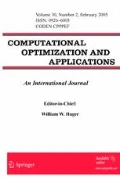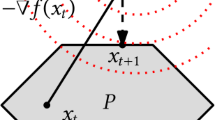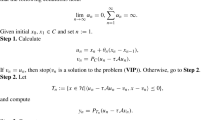Abstract
Optimization problems using total variation frequently appear in image analysis models, in which the sharp edges of images are preserved. Direct gradient descent methods usually yield very slow convergence when used for such optimization problems. Recently, many duality-based gradient projection methods have been proposed to accelerate the speed of convergence. In this dual formulation, the cost function of the optimization problem is singular, and the constraint set is not a polyhedral set. In this paper, we establish two inequalities related to projected gradients and show that, under some non-degeneracy conditions, the rate of convergence is linear.
Similar content being viewed by others
References
Aujol, J.F.: Some first-order algorithms for total variation based image restoration. J. Math. Imaging Vis. 34, 307–327 (2009)
Barzilai, J., Borwein, J.M.: Two-point step size gradient methods. IMA J. Numer. Anal. 8, 141–148 (1988)
Bertsekas, D.P.: On the Goldstein-Levitin-Polyak gradient projection method. IEEE Trans. Autom. Control AC-21(2), 174–184 (1976)
Bertsekas, D.P.: Nonlinear Programming. Athena Scientific, Belmont (1999)
Birgin, E.G., Mart’inez, J.M., Raydan, M.: Nonmonotone spectral projected gradient methods on convex sets. SIAM J. Optim. 10, 1196–1211 (2000)
Bobson, D.C., Vogel, C.R.: Convergence of an iterative method for total variation denoising. SIAM J. Numer. Anal. 34(5), 1779–1791 (1997)
Bresson, X., Esedoglu, S., Vandergheynst, P., Thiran, J.P., Osher, S.: Fast global minimization of the active contour/snake model. J. Math. Imaging Vis. 28(2), 151–167 (2007)
Calamai, P.H., More, J.J.: Projected gradient methods for linear constrained problems. Math. Program. 39, 93–116 (1987)
Chambolle, A.: An algorithm for total variation minimization and applications. J. Math. Imaging Vis. 20(1–2), 89–97 (2004)
Chambolle, A.: Total variation minimization and a class of binary MRF models. In: EMMCVPR, vol. 3757(1–2), pp. 136–152 (2005)
Chan, T.F., Mulet, P.: On the convergence of the lagged diffusivity fixed point method in total variation image restoration. SIAM J. Numer. Anal. 36(2), 354–367 (1999)
Chan, T.F., Vese, L.A.: An active contour model without edges. IEEE Trans. Image Process. 10(2), 266–277 (2001)
Chan, T.F., Wong, C.K.: Total variation blind deconvolution. IEEE Trans. Image Process. 7(3), 370–375 (1998)
Chan, T.F., Golub, G.H., Mulet, P.: A nonlinear primal-dual method for total variation-based image restoration. SIAM J. Sci. Comput. 20(6), 1964–1977 (1999)
Chan, T.F., Esedoḡlu, S., Nikolova, M.: Algorithms for finding global minimizers of image segmentation and denoising models. SIAM J. Appl. Math. 66(5), 1632–1648 (2006) (electronic)
Dai, Y.H., Liao, L.Z.: R-linear convergence of the Barzilai and Borwein gradient method. IMA J. Numer. Anal. 22, 1–10 (2002)
Dai, Y.H., Hager, W.W., Schittkowski, K., Zhang, H.: The cyclic Barzilai-Borwein method for unconstrained optimization. IMA J. Numer. Anal. 26, 604–627 (2006)
Dunn, J.C.: On the convergence of projected gradient processes to singular critical points. J. Optim. Theory Appl. 55, 203–216 (1987)
Evans, L.C.: Measure Theory and Fine Properties of Functions. CRC Press, Boca Raton (1992)
Figueiredo, M.A.T., Nowak, R.D., Wright, S.J.: Gradient projection for sparse reconstruction: application to compressed sensing and other inverse problems. IEEE J. Sel. Top. Signal Process. 1, 586–597 (2007)
Friedlander, A., Martinez, J.M., Molina, B., Raydan, M.: Gradient method with retards and generalizations. SIAM J. Numer. Anal. 36, 275–289 (1999)
Gafni, E.M., Bertsekas, D.P.: Convergence of a gradient projection method. Report LIDS-P-1201, Lab. for Info. and Dec. Systems, M.I.T. (1982)
Goldstein, A.A.: Convex programming in Hilbert space. Bull. Am. Math. Soc. 70, 709–710 (1964)
Goldstein, T., Osher, S.: The split Bregman method for l 1 regularized problems. SIAM J. Imaging Sci. 2(2), 323–343 (2009)
Kolmogorov, V., Boykob, Y., Rother, C.: Applications of parametric maxflow in computer vision. In: International Conference on Computer Vision, pp. 1–8 (2007)
Levitin, E.S., Poljak, B.T.: Constrained minimization methods. U.S.S.R. Comput. Math. Math. Phys. 6, 1–50 (1965)
Luo, Z.Q., Tseng, P.: On the linear convergence of descent methods for convex essentially smooth minimization. SIAM J. Control Optim. 30(2), 408–425 (1992)
Nesterov, Y.: Introductory Lectures on Convex Optimization: A Basic Course. Kluwer Academic, Dordrecht (2004)
Nesterov, Y.: Gradient methods for minimizing composite objective function. Core discussion paper (2007)
O’Neil, B.: Elementary Differential Geometry. Academic Press, San Diego (1966)
Rudin, L., Osher, S., Fatemi, C.: Nonlinear total variation based noise removal algorithms. Physica D 60, 259–268 (1992)
Vese, L.A., Chan, T.F.: A multiphase level set framework for image segmentation using the Mumford and Shah model. Int. J. Comput. Vis. 50, 271–293 (2002)
Vogel, C.R., Oman, M.E.: Iterative methods for total variation denoising. SIAM J. Sci. Comput. 17(1), 227–238 (1996)
Vogel, C.R., Oman, M.E.: Fast, robust total variation-based reconstruction of noisy, blurred images. IEEE Trans. Image Process. 7(6), 813–824 (1998)
Wright, S.J.: Identifiable surfaces in constrained optimization. SIAM J. Control Optim. 31(4), 1063–1079 (1992)
Yu, G., Qi, L., Dai, Y.: On nonmonotone Chambolle gradient projection algorithms. J. Math. Imaging Vis. 35, 143–154 (2009)
Zarantonello, E.H.: Contributions to Nonlinear Functional Analysis: Proceedings. Academic Press, New York (1971)
Zhu, M., Wright, S.J., Chan, T.F.: Duality-based algorithms for total variation image restoration. UCLA computational and applied mathematics report, 08-33 (2008)
Author information
Authors and Affiliations
Corresponding author
Rights and permissions
About this article
Cite this article
Chen, P., Gui, C. Linear convergence analysis of the use of gradient projection methods on total variation problems. Comput Optim Appl 54, 283–315 (2013). https://doi.org/10.1007/s10589-011-9412-4
Received:
Published:
Issue Date:
DOI: https://doi.org/10.1007/s10589-011-9412-4




